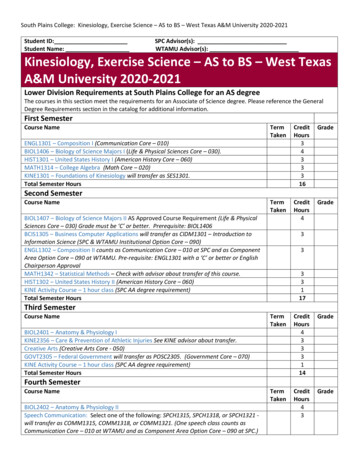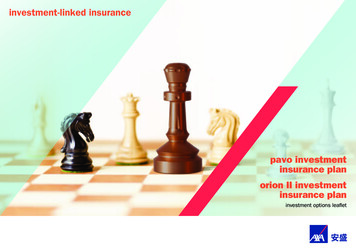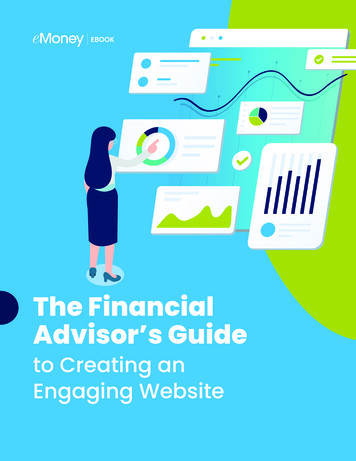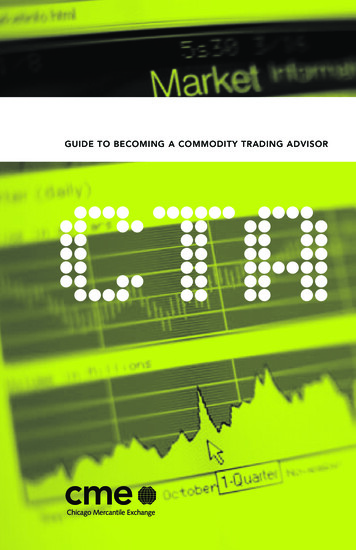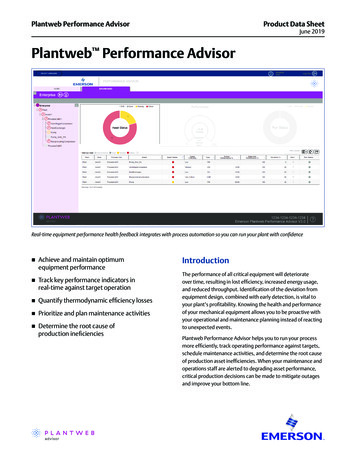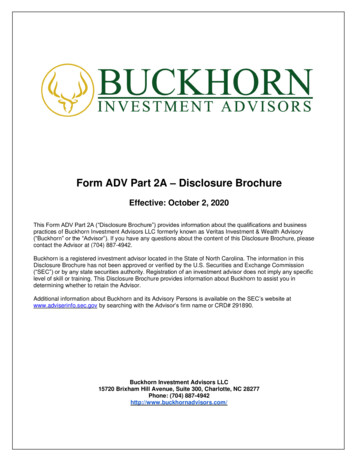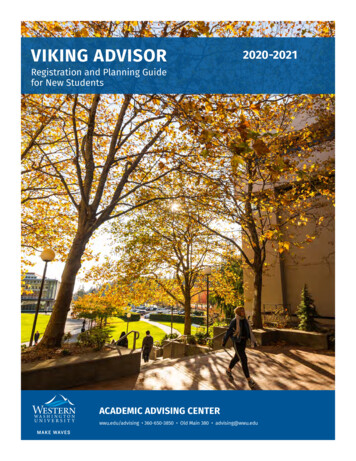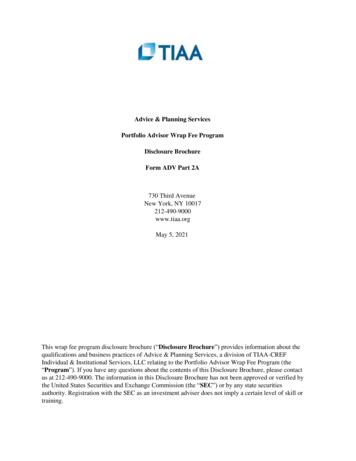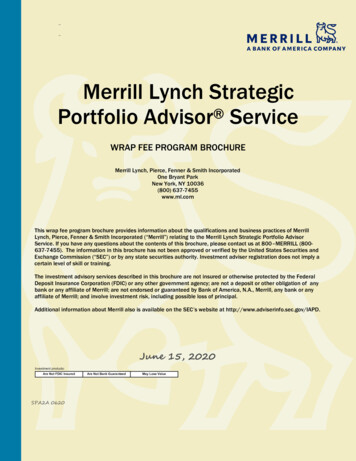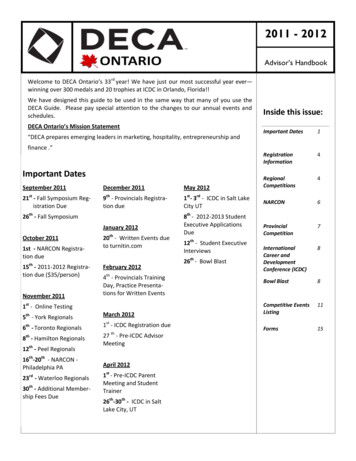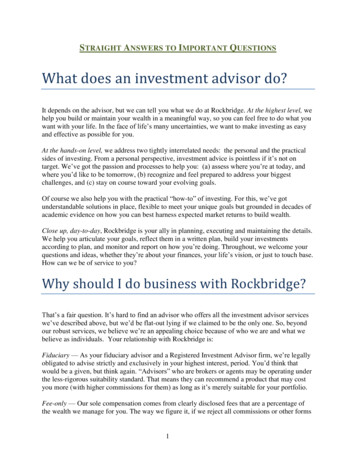
Transcription
STRAIGHT ANSWERS TO IMPORTANT QUESTIONSWhat does an investment advisor do?It depends on the advisor, but we can tell you what we do at Rockbridge. At the highest level, wehelp you build or maintain your wealth in a meaningful way, so you can feel free to do what youwant with your life. In the face of life’s many uncertainties, we want to make investing as easyand effective as possible for you.At the hands-on level, we address two tightly interrelated needs: the personal and the practicalsides of investing. From a personal perspective, investment advice is pointless if it’s not ontarget. We’ve got the passion and processes to help you: (a) assess where you’re at today, andwhere you’d like to be tomorrow, (b) recognize and feel prepared to address your biggestchallenges, and (c) stay on course toward your evolving goals.Of course we also help you with the practical “how-to” of investing. For this, we’ve gotunderstandable solutions in place, flexible to meet your unique goals but grounded in decades ofacademic evidence on how you can best harness expected market returns to build wealth.Close up, day-to-day, Rockbridge is your ally in planning, executing and maintaining the details.We help you articulate your goals, reflect them in a written plan, build your investmentsaccording to plan, and monitor and report on how you’re doing. Throughout, we welcome yourquestions and ideas, whether they’re about your finances, your life’s vision, or just to touch base.How can we be of service to you?Why should I do business with Rockbridge?That’s a fair question. It’s hard to find an advisor who offers all the investment advisor serviceswe’ve described above, but we’d be flat-out lying if we claimed to be the only one. So, beyondour robust services, we believe we’re an appealing choice because of who we are and what webelieve as individuals. Your relationship with Rockbridge is:Fiduciary — As your fiduciary advisor and a Registered Investment Advisor firm, we’re legallyobligated to advise strictly and exclusively in your highest interest, period. You’d think thatwould be a given, but think again. “Advisors” who are brokers or agents may be operating underthe less-rigorous suitability standard. That means they can recommend a product that may costyou more (with higher commissions for them) as long as it’s merely suitable for your portfolio.Fee-only — Our sole compensation comes from clearly disclosed fees that are a percentage ofthe wealth we manage for you. The way we figure it, if we reject all commissions or other forms1
of outside compensation, we’ll never have to worry about being tempted by them. You are theonly person who compensates us for our advice to you, and we think that’s in your best interest.Right-sized — In terms of advisor selection, you can be an ocean-bound guppy or a whale in apaddling pool. Our business model is sized to best serve clients with wealth in the range of 500,000 to 5 million, as big fish in our right-sized pond. Over the years, we’ve built abalanced team of investment advisors, financial and retirement planners, service support, andoffice administration to fully address without exceeding our clients’ needs.Fees, schmees. Can’t I do this myself?Yes, you can, sort of. Good, basic investing isn’t rocket science. But even so, most people don’tdo it nearly as well on their own.To cite the hard evidence, since 1994, financial market research firm DALBAR has released anannual update on its Qualitative Analysis of Investor Behavior (QAIB), indicating that investorssignificantly underperform the very investments they hold. According to the most recent QAIB,covering 20 years of data through 2010, investors earned just under 4 percent compared to S&P500 returns of just over 9 percent. That’s a lot of wealth left on the table.DALBAR and many other studies demonstrate that investors’ inability to capture availablereturns is a self-inflicted wound that results from over-active trading. In the absence of carefulplanning and disciplined, long-term strategy, our natural tendencies are to react to emotionsrather than adhere to strategy, which results in buying and selling at the wrong times, for thewrong reasons. Among our greatest advisor roles is to ensure that you stick to your well-builtplan over time and across volatile markets. This may sound like no big deal. But the evidence isclear that individual investors lack the resolve to go it alone.But let’s say you have what it takes to stay the course with basic investing. There are stillnumerous ways we can add substantial value. To name a few, we can: Assess your existing investments and let you know of any concerns, such as hidden costs orinefficient activities. Suggest and explain appropriate, more cost-effective alternatives.Refine how and where your assets are allocated to create a risk/reward profile that makessense for you. Maintain or update your allocations as the market and your goals evolve.Intelligently divide your investments between your taxable and tax-sheltered accounts, tominimize the damaging impact of taxes across your portfolio.Provide access to Dimensional Fund Advisor funds, which we believe represent a step upfrom basic index investing, and are only available via the guidance of an investment advisor.Coordinate your investment activities within the context of your overall wealth managementneeds, including insurance, estate planning, charitable intents and other related concerns.Provide ongoing counsel and education as new opportunities or new challenges arise.2
In short, most investors aren’t investing for fun; they’re investing for their life. In that context,wise fund selection is merely part of a much greater whole that warrants objective, advisoryoversight. It warrants Rockbridge Investment Management.Isn’t the stock market too risky for myretirement investments?The short answer is, it depends. First, it helps to understand different kinds of investment risk:1. “Idiosyncratic” risk — This is a fancy term for the risk inherent to individual securities. Forexample, Apple stock at least temporarily plummeted when the company’s charismatic leaderSteve Jobs retired, but of course this was a risk exclusive to Apple. By diversifying (usinglow-cost mutual funds to capture the broad returns of stock asset classes instead of trying tocapture the returns of individual stocks) we can spread your financial eggs across multiplebaskets and effectively eliminate this form of risk from the equation.2. Market risk (volatility) — Stock market risk in the form of volatility can cause the shortterm value of your investments to move up and down, sometimes dramatically and oftenunpredictably. But because “short-term” volatility can last longer than those facingretirement can comfortably afford, it’s prudent to be wary of taking on more than isnecessary. However, this is key: You can expect these same stock market risks to generatelong-term wealth for you within your well-diversified portfolio. Nobody likes the uncertaintyinherent in market risk, but even in retirement, your financial goals may well include theneed to build in a measure of it, to maintain or build wealth.3. Spending power risk — On the flip side of market risk, there’s the risk of being out of themarket. It seems logical to assume that a flight to quality makes you “safer,” but a problemwith this assumption is that risk-free investments lose spending power over time. In otherwords, if your dollar isn’t earning market returns, it eventually buys you less than it used to: 1 in 1980 bought you more than 1 today. So even in retirement, market investing helps youmanage spending power risk.So, we would suggest that the question isn’t whether the stock market is “too risky,” but ratherwhether you’re managing your investment risks according to your retirement goals. We advisetaking on market risk in proportion to your financial goals, and offsetting it with fixed incomeassets to dampen the volatility and meet your income needs. How much of each? This is wherean informed advisor can make a huge difference in helping you find the right mix for you.3
How are you going to protect my moneyif there’s another economic meltdown?The best time to “react” to an economic meltdown is long before it happens. To manage yourwealth through good times and bad, we emphasize planning and preparation as the foundationupon which to build.When investors face bad economic (or other) news, the typical response is to sell stocks and fleeto Treasuries or similar “safe harbor” holdings. Charts and graphs show the massive outflows indramatic relief. Unfortunately, what’s really happening is that they are selling low (when stockprices are plummeting) and buying high (when Treasury rates are unattractive). When the coastlooks clear, they perform the reverse, effectively buying high and selling low.We would argue investors are engaging in this self-destructive behavior because they have notprepared for the downturn. Having a customized investment plan, preferably in writing, is likehaving a well-practiced fire drill in place. Instead of being left fearful and reactionary, you knowwhat to do when the time comes. Your plan should specify desired asset allocations among riskyand less-risky investments, as well as a rebalancing strategy for staying true to your goals amidstever-changing market conditions. Then, when the markets turn frightful, we encourage you torely on your plan, devised during calmer times, to see you through.By the way, even for those already in the grips of a market downturn, it’s never too late to form aprudent plan for your next steps. Regardless of market conditions, we help investors assess theirexisting circumstances and set realistic goals for moving forward with improved confidence.Why can I expect your way of managingmoney to work well for me?Perhaps our biggest point of distinction is that all of our services, strategies and advice arecentered on ensuring that your unique goals, challenges and opportunities are the driving forcebehind your financial activities.Too often, financial decisions are made in a void of understanding the “why” behind the wealth:How do you feel about your financial circumstances today? Where do you hope to end up? Whatare the challenges you face in getting there? What are your interests and who are your valuedrelationships?We begin by exploring these critical questions with you. And we remain in touch with youthroughout our relationship to ensure we’re apprised of the most current answers. Only then do4
we suggest sensible financial tactics and manage targeted portfolios to help you make your waytoward your most desired life goals.What other tough questions can we answer for you? Let’s continue the conversation.www.rockbridgeinvest.com5
academic evidence on how you can best harness expected market returns to build wealth. Close up, day-to-day, Rockbridge is your ally in planning, executing and maintaining the details. We help you articulate your goals, reflect them in a written plan, build your investments accor
